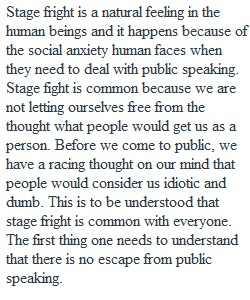


Q After studying Chapter 3 Speaking Confidently in your text (and competing the quiz), let's take a different approach to understanding speech anxiety. TED-Ed. (2013, October 8). The science of stage fright (and how to overcome it) - Mikael Cho [Video]. YouTube.https://www.youtube.com/watch?v=K93fMnFKwfI (Links to an external site.) Watch the video above to learn more about that "nervous feeling" you may get before you present a speech. Where does it come from and how do you "deal" with it? You'll want to ask yourself specifically: • According to this video, what is stage fright? • Describe some of the psychological or physiological reactions you experience just prior to getting up in front of a group to present or perform. • Explain why (according to the video) it's often difficult to entirely rid ourselves of stage fright, and why, even if we could, we might not want to. In your own words, why do you think some nervousness might actually be helpful when giving a speech? • Finally, of the 6 anxiety-reducing tips that the video and the reading in this lesson provided you with, which 3 do you believe would be most helpful in reducing the stage fright you experience prior to presenting in front of a camera or in a public setting? Describe the 3 tips specifically and explain why using them would be helpful to you. So, once you've gathered your thoughts about these 4 bullet points, tell us what you've learned in a "low pressure" 3 to 4 minute "talk". Tell us what you discovered. Use personal experience along with information from the video and the text. Yes, your assignment here is to give a brief, informal talk about speech anxiety. (You're not doing a written discussion here, you're telling us what you learned in a speech.) You see, this is your opportunity to learn more about speech anxiety by speaking to your classmates without the pressure of being graded on delivery techniques. We're focusing on content here. We're focusing on your message. What do you want to say about your experience with the nervousness that comes from speaking in front of a group of people or in front of a camera lens? Here's an example of a student from the Spring 2021 semester, presenting her response to the Science of Stage Fright video: Please do not copy the work of this student. You want your speech to be original. Speak from your own perspective. Share your own thoughts supported by information you learned from your text and the video. (Use the example as a guide for your informal speech.) ------------------------------------------------ Please remember to add closed captioning to your speeches before uploading. To learn how to record, add captioning, and post your video, you will need to study the following: How to Record, Caption, and Post Videos Using Canvas Studio. (You'll find both step-by-step written and video instructions.) It is essential to make your speech accessible to all classmates so make sure you add closed-captioning BEFORE you upload your video. ------------------------------------------------ You will then want to respond to at least 3 of your classmates in writing. Do your best to develop written responses which will move the conversation forward. Those are the types of "follow-up comments" we're looking for throughout this class. You see, 2 or 3 sentences about what you "liked" simply won't do. Always plan to go a step further. Engage your classmates in a written conversation about their concerns with stage fright and how they intend to resolve most of it prior to or during their next speech. Review the rubric carefully to see how this assignment will be evaluated.
View Related Questions